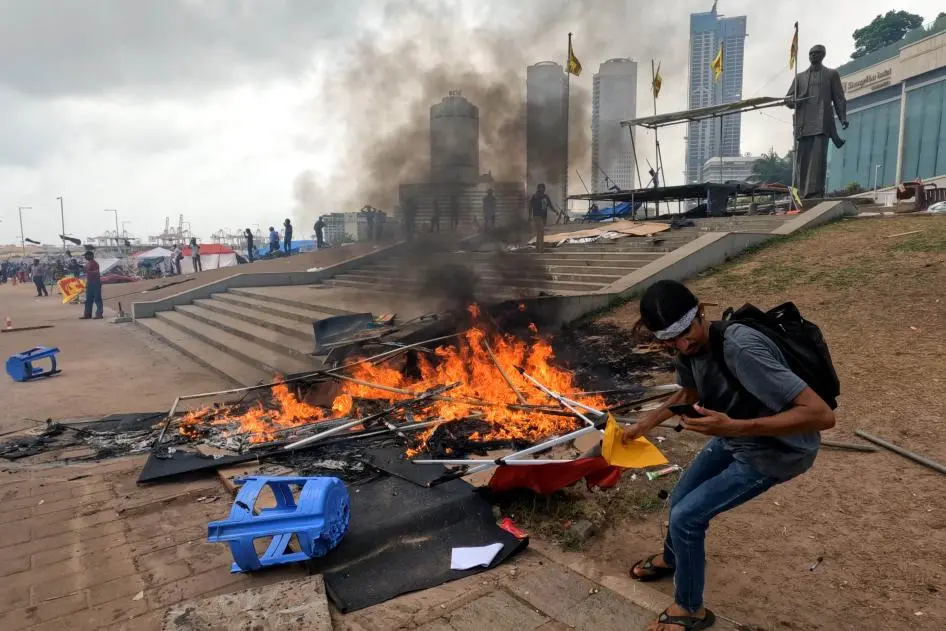These days, when you scroll through Facebook, you encounter some truly bizarre shifts. People who once championed gay rights are now shouting anti-gay slogans. Those who advocated for educational reform are suddenly opposing it. Individuals who insisted that thieves be caught and murderers arrested are now saying otherwise. Supporters of legalizing sex work have reversed their stance. Even those who once called for comprehensive sex education are now rejecting it. This is a serious and troubling development. Why is this happening?
Let me be clear: I have no obligation to defend this government. I voted against it. But I cannot simply turn around and deny what I wrote after joining the Ravaya newspaper in 2013. I stand by those words—then, now, and in the future. This is not about party politics.
I have every reason to be concerned. After we introduced the concept of good governance in 2015, a similar ideological backlash emerged in 2016–17. Back then, neither Ranil nor Maithripala had the courage to confront it or even recognize its danger.
Brainwashing effort aimed at protecting criminals
Today, the same pattern is repeating. I first noticed it when posters began appearing across the country from the ultra-nationalist Sinhala group, the Manel Mal Movement, demanding the release of former Navy Commander Nishantha Ulugetenne—arrested for abducting and murdering innocent young men. What began as a fringe campaign has now evolved into a widespread ideological brainwashing effort aimed at protecting criminals.
The same group that waged war against the good governance movement in 2016 has resumed its ideological offensive. The difference now is that some who once supported good governance have, for partisan reasons, thrown their support behind this campaign to elevate their preferred leader. This gang once rallied behind Gotabaya Rajapaksa. Today, they’re doing it for Namal Rajapaksa.
What is their mission now? Their goal is to propagate the idea that institutions like the Police, the Criminal Investigation Department (CID), and the Bribery Commission are politicised, and these bodies now operate under the influence of the JVP headquarters in Pelawatte. Their narrative—that those arrested on corruption charges were innocent and takan in for political reasons —is being pushed so aggressively that it risks becoming mainstream opinion. This is the same ideological manipulation we saw after 2016. Remember how bad it got? Maithripala had to turn off the lights at his meetings.
And what about today? It’s no different. President Anura Kumara had to rush to Kandy to meet the Mahanayakas and assure them that the government does not support gay rights. Is that all? No. The ideological pressure is so intense that the government has reportedly instructed agencies like the CID to avoid certain arrests.
This government is just as afraid of this ideological war as Maithripala Sirisena’s was. That’s why it reversed course after Ranil Wickremesinghe was arrested. That’s why it has delayed arrests of figures like Gammanpila and Manusha. When the CID requests information from the Navy about the Ulugetenne case and the disappearance of abducted children, the Navy claims—just like in 2016—that the records were destroyed. Was there a tsunami at Navy headquarters? No. The truth is obvious.
This is the same dangerous pattern repeating itself. The government, out of fear, is backtracking on its actions and allowing this distorted narrative to take root in society. That’s the real threat.
Now, the Easter attacks have resurfaced in public discourse. It seems the CID is hesitating to arrest certain individuals linked to the investigation. Why? Because the political leadership is shaken by the growing opposition. Figures like Ravi Seneviratne and Shani Abeysekara who are spearheading the investigations are once again being targeted by this gang. Their strategy is to shape public opinion so that any future arrests appear to be politically motivated revenge. I believe this tactic has already been used against the Bribery Commission and DG Ranga Disanayake. Ranga’s conduct seems to have been influenced towards this.
Many who dream of making Namal Rajapaksa President in 2029 are working to build an ideological shield around him and his allies—those who may face corruption charges. They know the truth. They know that if investigations proceed, their leader won’t be President in 2029—he’ll be in prison. Ironically, some who hope to see Ranil return to power in 2029 are now riding Namal’s wave. But they don’t understand what happens when a dangerous ideology gains social momentum.
It’s one thing for citizens to wait and see. But if the government waits, it will be catastrophic.
Soon, we might see posters glorifying a high-ranking soldier who once stood with Gotabaya and Ranil. The number of pilgrims visiting Mahinda Rajapaksa is already rising.
It’s time to act, Mr. President.
( Adopted and edited version of a Face Book post by award winning journalist K. Sanjeewa)
